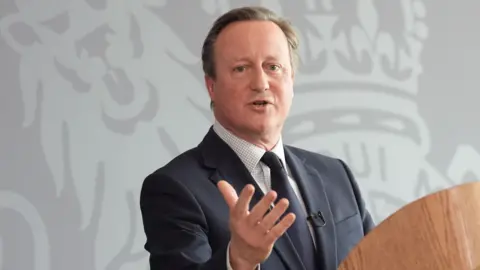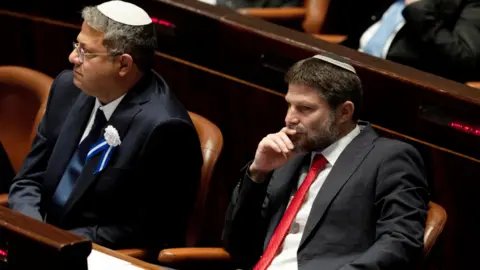I had plans to sanction Israeli ministers - Cameron
 PA Media
PA MediaDavid Cameron has urged the UK to consider sanctioning two Israeli ministers as a way of "putting pressure" on the country to act within international law.
Speaking to the BBC's Today programme, the former Conservative foreign secretary said before the election he had been "working up" plans to put sanctions on Finance Minister Bezalel Smotrich and National Security Minister Itamar Ben-Gvir.
He described the two men as "extremist" and said using sanctions would send a message to Israeli Prime Minister Benjamin Netanyahu that "this is not good enough and has to stop".
The BBC has contacted Smotrich and Ben-Gvir for a response.
Lord Cameron said both men had "said things like encouraging people to stop aid convoys going into Gaza, they have encouraged extreme settlers in the West Bank with the appalling things they have been carrying out".
Earlier this year, Smotrich suggested it might be "justified and moral" to starve Gazans and has called for Palestinian residents to leave and make way for Israelis who could "make the desert bloom".
Asked why the planned sanctions did not go ahead, Lord Cameron, who was foreign secretary between 2023 and 2024, said he had been advised that it would have been "too much of a political act" during the election.
UK Foreign Secretary David Lammy has condemned comments by the Ben-Gvir and Smotrich as "entirely unacceptable".
Speaking at a Labour conference event last month, he said: "We are very worried about escalatory behaviour, about inflamed tensions.
"I’m absolutely clear, if we have to act, we will act. I’m in discussions with G7 partners, particularly European partners, on that. I’m not announcing further sanctions today but that is kept under close review."
Asked in Parliament about sanctioning the Be-Gvir and Smotrich, Foreign Office minister Anneliese Dodds said that the government kept its sanctions regime "closely under review" and would announce any changes.
 Reuters
ReutersWhitehall sources have told the BBC that Lord Cameron's plan to impose a travel ban and asset freeze on both men had been well advanced and ready to go.
The imposition of sanctions requires a detailed and legally binding case which takes time to compile.
But they said the decision was put on hold for fear of inflaming political tensions during campaigning for the general election.
There were concerns about triggering violence in constituencies where views about the Middle East were polarised.
It is also understood the United States at the time opposed sanctioning Mr Smotrich and Ben-Gvir. The UK tends to impose sanctions alongside US and the European Union to maximise their impact.
The Foreign Office never comments on or predicts future sanctions decisions; however, some sources said any decision on sanctioning the two Israeli ministers might be delayed until after the US election.
They also said that with such little UK leverage over Israel, domestic political factors may play a bigger part in any decision.
Labour has already restricted UK arms sales to Israel, refunded the UN agency helping Palestinians, and lifted opposition to the International Criminal Court having the right to seek an arrest warrant for Netanyahu.
Another decision against the Israeli government might be seen as one step too far.
The sources also said there was the risk UK sanctions could be seen as a badge of honour by the two ministers.
Tom Keatinge, from the Royal United Services Institute think tank, told the BBC that putting sanctions on Ben-Gvir and Smotrich would be a "significant move" aimed at sending a "major political message" to Israel.
He also said there was "not a precedent" for the UK government sanctioning elements of an ally country.
He added that there were "practical issues" as sanctions required "a lot of work" and that the Foreign Office's sanctions director was already "heavily overworked" due to issues related to Russia.
On Tuesday, the Foreign Office announced new sanctions targeted at illegal settler outposts and four organisations it said had "supported and sponsored violence against communities in the West Bank".
The three settler outposts hit by the financial restrictions are Tirzah Valley Farm Outpost, Meitarim Outpost, and Shuvi Eretz Outpost.
The four organisations targeted are Od Yosef Chai Yeshiva, a religious school; Hashomer Yosh, a non-governmental organisation that provides volunteers for illegal outposts; Torat Lechima, an Israeli charity and Amana, a construction company that has overseen the establishment of outposts.
The announcement follows previous sanctions announced in February and May.
The foreign secretary said the measures would "help bring accountability to those who have supported and perpetrated such heinous abuses of human rights".
Lord Cameron argued the UK government should seek to influence Israel by putting restrictions on some of its ministers instead of pursuing the "wrong path" of suspending arms exports.
Last month, the UK government restricted arms sales to Israel saying there was a "clear risk" the equipment could be used to commit serious violations of international law.
But Lord Cameron said restricting arms sales to Israel while simultaneously helping to protect the country from Iranian attacks "made no sense".
The former PM said everyone wanted to see the conflict end, but "end in a sustainable way".
He said Israel had faced attacks from Hamas in the south and Hezbollah in the north and it was right to back the country's right to self-defence.
"But it is not a blank cheque, it is not unconditional," he said.
"We do want to make sure aid gets through into Gaza, we do want to see the role of the UN in Lebanon to be respected."
